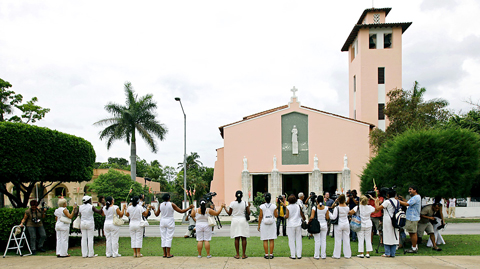Roman Catholic Cardinal Jaime Ortega said on Sunday he managed to convince the Cuban government to lift it’s nearly monthlong ban on street protests by “Ladies in White” — the wives and mothers of political prisoners.
Ortega said the Church was “always dealing with” political prisoner issues with the Cuban government.
“In ecclesiastical terms, I would say, for ever and ever,” he said.

PHOTO: REUTERS
The Archbishop of Havana made his announcement while delivering a mass at the Church of Santa Rita, after which he presided over a march by 12 members of the Ladies in White down the capital’s Fifth Avenue.
For three previous Sundays, similar marches were attempted, but stopped outside the church by police, who said the group lacked a protest permit.
Opposition groups, including the Ladies in White, have recently stepped up their challenge to government authority by regularly taking to the streets.
The protests have aroused strong criticism of the Cuban regime from Europe, the US and international rights organizations, but Havana has so far dismissed it all as a political campaign.
The Cuban government refuses to admit it holds political prisoners and accuses the Ladies in White of being “mercenaries” and agents of US-sponsored “subversion” on the island.
Havana has come under fire internationally and from activists inside Cuba since the Feb. 23 death of dissident Orlando Zapata after an 85-day prison hunger strike to demand the release of 26 fellow ailing political prisoners.
A second dissident, independent journalist Guillermo Farinas, 48, took up the cause with his own hunger strike a day after Zapata’s death and has since rejected the advice of his mother and others to drop his protest lest he die.
Ortega also told reporters that the Catholic Church on Sunday had once again asked Farinas to be more “flexible” in his stance and end his 68-day hunger strike.
“It’s more or less up to him,” Ortega said, adding that the frail dissident has already been visited three times by a bishop and even more often by local priests, “at his mother’s behest to ask him to stop his hunger strike. But he refuses.”

Kehinde Sanni spends his days smoothing out dents and repainting scratched bumpers in a modest autobody shop in Lagos. He has never left Nigeria, yet he speaks glowingly of Burkina Faso military leader Ibrahim Traore. “Nigeria needs someone like Ibrahim Traore of Burkina Faso. He is doing well for his country,” Sanni said. His admiration is shaped by a steady stream of viral videos, memes and social media posts — many misleading or outright false — portraying Traore as a fearless reformer who defied Western powers and reclaimed his country’s dignity. The Burkinabe strongman swept into power following a coup in September 2022

‘FRAGMENTING’: British politics have for a long time been dominated by the Labor Party and the Tories, but polls suggest that Reform now poses a significant challenge Hard-right upstarts Reform UK snatched a parliamentary seat from British Prime Minister Keir Starmer’s Labor Party yesterday in local elections that dealt a blow to the UK’s two establishment parties. Reform, led by anti-immigrant firebrand Nigel Farage, won the by-election in Runcorn and Helsby in northwest England by just six votes, as it picked up gains in other localities, including one mayoralty. The group’s strong showing continues momentum it built up at last year’s general election and appears to confirm a trend that the UK is entering an era of multi-party politics. “For the movement, for the party it’s a very, very big

ENTERTAINMENT: Rio officials have a history of organizing massive concerts on Copacabana Beach, with Madonna’s show drawing about 1.6 million fans last year Lady Gaga on Saturday night gave a free concert in front of 2 million fans who poured onto Copacabana Beach in Rio de Janeiro for the biggest show of her career. “Tonight, we’re making history... Thank you for making history with me,” Lady Gaga told a screaming crowd. The Mother Monster, as she is known, started the show at about 10:10pm local time with her 2011 song Bloody Mary. Cries of joy rose from the tightly packed fans who sang and danced shoulder-to-shoulder on the vast stretch of sand. Concert organizers said 2.1 million people attended the show. Lady Gaga

SUPPORT: The Australian prime minister promised to back Kyiv against Russia’s invasion, saying: ‘That’s my government’s position. It was yesterday. It still is’ Left-leaning Australian Prime Minister Anthony Albanese yesterday basked in his landslide election win, promising a “disciplined, orderly” government to confront cost-of-living pain and tariff turmoil. People clapped as the 62-year-old and his fiancee, Jodie Haydon, who visited his old inner Sydney haunt, Cafe Italia, surrounded by a crowd of jostling photographers and journalists. Albanese’s Labor Party is on course to win at least 83 seats in the 150-member parliament, partial results showed. Opposition leader Peter Dutton’s conservative Liberal-National coalition had just 38 seats, and other parties 12. Another 17 seats were still in doubt. “We will be a disciplined, orderly